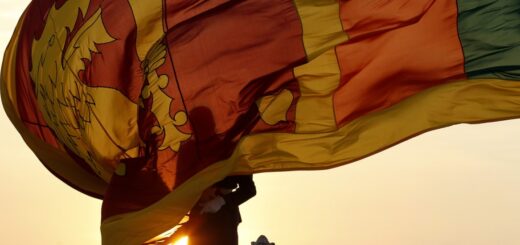No government in the country or no country in the government?
By Malinda Seneviratne
The Mahanayaka Theras of three Nikayas and other Sangha Sabhas, expressing their opinion on constitutional reform, have made it clear that they are opposed to moves “that could generate crises”.
While calling for immediate electoral reform, this Sangha Council headed by the Mahanayaka Theras that met in Kandy recently has urged that the ratification of the International Convention for the Protection of All Persons from Enforced Disappearances (“Convention on Enforced Disappearances” henceforth) through a bill in Parliament be postponed in order to give parliamentarians more time to study the same. They have also asked that a special committee be appointed to look into the grievances of Buddhists with regard to religion and culture in the context of ‘prevailing racial and religious unrest’, pointing out also that religious places of archaeological importance should be protected. Finally, they’ve called for speedy resolution to the ‘SAITM crisis’.
Let’s focus on constitutional reform. Constitutional reform is a serious matter and demands sober reflection on proposals followed by intelligent debate among law-makers, ideally complemented by public discussion on the relevant subject. That has not been the tradition in Sri Lanka, unfortunately.
The 13th Amendment, following the Indo-Lanka Accord was introduced in part while the people were kept in the dark about the contents. Just before the United National Party lost the two-thirds parliamentary edged secured through the shameful Referendum of 1982, the government led by that party muscled in several partisan amendments. Mahinda Rajapaksa bulldozed through Parliament with the 18th Amendment.
Even the relatively progressive 17th and 19th Amendments were hardly debated, the former perhaps due to the parivasa circumstances that birthed it and the latter probably because the President wanted certain powers retained and the parliamentarians wanted sway in appointments to the independent commissions.
This partisan history naturally raises doubts over clarity and intention. The case for reform has certainly not been helped by vicious and vindictive way in which this administration has gone after military personnel accused of numerous violation even as it has mollycoddled known terrorists and has bent over backwards to please the political and administrative ‘near and dear’ of the LTTE.
The Mahanayaka Theras, then, are expressing a set of concerns that many nationalists groups have raised. The concerns are legitimate for other reasons too.
Those who have backed bills such as this have at times also called for federalism, have demanded that the LTTE be given parity of status, bemoaned the military offensive against the LTTE (even though the LTTE was holding hundreds of thousands of Tamils hostage) and have been marked by a manifest and rabid anti-Buddhist rhetoric.
However, what mostly strengthens the argument for caution in constitutional reform is the sloth, arrogance and mal-intent demonstrated by this government on this subject. We already mentioned the 19th Amendment. It was designed to keep the cabinet inflated through the dubious clause called ‘national government’. It made the ‘independence’ of independent commissions a joke. And quite in contrast to solemn campaign pledges, it left the executive presidency pretty much intact. Even today with a single and modest tweak, the President can turn the political equation upside down. That ‘privilege’ tells us how much ‘reform’ was deemed ‘enough’ by the reformers. To the detriment of the citizen of course.
Then there is the zero-action on electoral reform. This, by the way, is what gives legitimacy to the declaration by the Mahanayakas. In April 2015, the President vowed to supporters of his party gathered at Vihara Maha Devi Park that he will see election reform through. It’s more than two years now. There isn’t even a murmur on this subject.
Local government elections keep getting postponed for reasons that cannot be denied — this regime is scared to open itself to assessment by the people and each passing day the fear increases.
The only security (in a relative sense) that parliamentarians have in terms of their political future, under these circumstances, is the very proportional representation system that electoral reform was supposed to do away with or at least amend.
The Government should, logically and morally, first deliver on promises made to the people of this country before ratifying through legislation international protocols or conventions it has seen fit to endorse. President Maithripala Sirisena has said ‘anyone watching TV [would] feel that there’s no government in the country.’ He is dismayed that ‘development activities, people’s welfare, the peaceful situation in the country’ are not being covered.
Well, all these claims can be contested and they have for good reasons too. However the ‘no government in the country’ principally flows from the fact that this government seems answerable to unknown non-nationals and is deaf to the pleas of the citizens. In other words, there’s no country in this government. The Mahanayaka Theras’ plea, one could read, is one which argues for the re-inclusion of nation in this government. A tall order at this point, one might say, but then again this is what might give longevity and relevance to this regime.


